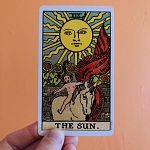Dramatherapy is a form of art psychotherapy that focuses on the intentional use of drama and theatre in therapy. Theatre tools such as stories, myths, improvisation, and role-play are used for healing.
Carl Jung was the first psychoanalyst to introduce archetypes into his practice. He was trying to understand from a psychological perspective what was happening in a séance he attended at university where a young girl seemingly transformed into a wiser older woman while under a trance. Jung hypothesized that this other more advanced personality existed but was not yet developed in the young girl, yet her capabilities could be unlocked. Due to this, Jung started to instruct his patients to read fairytales and myths to reach their unrealised potential.
I am familiar with using pictures as a mirroring tool in sessions. In my therapy toolbox, I have a pack of the cards from the game Dixit with fairytale images. Clients respond to these images to make meaning about their own lives; the image acts as a gentle nudge to express the wise and fantastical things that exist within them.
Over the last year, I have been also exploring archetypes found in Tarot cards and recently did a training course facilitated by Lindsay Mack. Tarot cards contain wonderful examples of archetypal imagery with a lot of credit to the artwork of Pamela Colman Smith. Many modern and more inclusive decks have been influenced by her artwork. Lindsay encourages her students to move away from a more traditional view of the Tarot and instead view it as a non-predictive helping tool. You can’t get it wrong she reassured us as the healing power of the archetypes belongs to us all. To her students, she emphasised the importance of developing their own inner inquiry work with the images from readings as well as the importance of practicing critical thinking, curiosity, and compassion with any interpretations of the archetypal imagery, especially when working with another person.
My definition of archetypes is malleable. Archetypes could also be called our inner caretaker or higher-self; the knowledge that exists in us all just underneath the surface. I am learning to trust my intuition and make time to listen to my inner knowledge. This has been helped by developing a practice of dialoguing with the archetypal images on cards. Asking simple questions like; what does my brain, heart, and body need? The responses supply me with emotional nourishment and are a dynamic form of self-inquiry.
Dramatherapy is holistic in its approach, which means it is concerned with the whole of you. Your thoughts, feelings, instincts, senses, hopes, dreams, likes, and dislikes. The therapist supports the whole of you without judgement. The physicality of Dramatherapy is an important factor as well as it creates a sense of unity between mind and body. Dramatherapy allows you to step into the being. This being could be acting out characters, feelings, or different parts of yourself.
Creative therapy allows for dialogue with one’s inner-self. Trust that there is a wealth of knowledge that exists within you.
Embodying our Inner Guides is a new seven-week Dramatherapy group.
Mondays 6:30-8pm at The Practice Rooms, Wesbury-on-Trym, BS9 3ED
Starting March 7th and running weekly till May 2nd (Easter break 11th & 18th April)
£200 for seven sessions
Four spaces are currently available
Who is this group for?
Those who wish to make more space for creativity and play in their lives
Those with a desire to build upon their existing meditation practice by using tools from theatre and drama
Those with an interest in the healing qualities of archetypes
Embodying our Inner Guides will be a small Dramatherapy group. A smaller group environment will allow members’ space to conduct their inner inquiry at a pace that is right for the individual.
For more information and to book your place please contact Molly via email -
molly@creative-therapy.co.uk
Or by phone on 07594 923601




